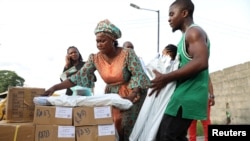Nigerian voters return to the polls Saturday to elect powerful state governors, two weeks after Muhammadu Buhari secured a second term in a delayed presidential vote.
The election is for 29 of the country’s 36 governors, who are among the most influential politicians in Nigeria, which is Africa’s biggest oil producer and has the continent’s largest economy. Many of the governors control budgets larger than those of small nations.
With so much at stake, many previous governorship elections have been marred by violence including shootings and armed gangs snatching ballot boxes. Some results are expected to emerge Sunday.
Buhari, of the All Progressives Congress (APC), beat Atiku Abubakar of the People’s Democratic Party (PDP) in last month’s presidential election with 15.2 million votes to 11.3 million, though on a turnout of just 35.6 percent.
Election violence
Situation Room, a monitoring mission made up of more than 70 civic groups, said 39 people were killed in election-related violence on the day of the presidential poll. In one incident, a gang shot dead two soldiers in the southern oil hub state of Rivers, prompting fears of more violence there Saturday.
“The Armed Forces of Nigeria, as a professional and reputable institution, wish to reassure the public that no reprisal attack will be carried out by any military personnel,” a military spokesman said Friday.
The army said it would work with the police to ensure people would be able to vote in “an environment devoid of violence and insecurity.”
Nigeria’s security forces have been stretched in the last few years by an Islamist insurgency in the northeast as well as by communal violence and banditry in other areas.
Hours before polls opened for the presidential vote, explosions rocked Maiduguri, capital of Borno state, epicenter of the insurgency. In neighboring Yobe, residents of the town of Geidam fled a militant attack around the same time.
Last election delayed
Last month’s election was delayed by a week after the electoral commission was unable to get ballots and results sheets to all areas on time.
Legislative elections were held Feb. 23 at the same time as the presidential poll, and Buhari’s APC secured key victories over the opposition PDP in many areas.
Bukola Saraki, a PDP member who was president of the upper house of parliament, lost his senatorial seat. Bitterly at odds with the presidency, Saraki had often worked to frustrate bills proposed by Buhari.
